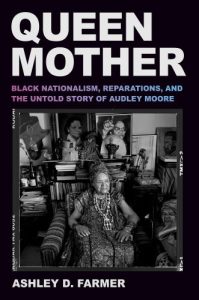
Review by Eleanor J. Bader
When award-winning professor and writer Ashley Farmer (Remaking Black Power: How Black Women Transformed an Era) discovered that there were no full-length biographies of influential Black nationalist Audley Moore (1898-1996), she set out to rectify the omission. The result, Queen Mother, charts Moore’s ascent as a community leader, first as a follower and supporter of Marcus Garvey, then as a leader in the US Communist Party, and finally as an advocate of reparations to the Black community for the sin of slavery and the continuing damage wrought by racism and white supremacy. It’s a powerful, insightful, and evocative look at a woman who eschewed feminism but made sure that her voice was heard by the men who led the movements she championed.
For most of her life, Moore was a revered speaker, writer, and activist, and spent decades working to galvanize support for the establishment of a separate Black nation within the US. She was also outspoken in her opposition to the integrationist efforts of those, like Martin Luther King Jr., who believed racial equality was both preferable and possible. Moore vehemently disagreed, and her efforts brought her into contact with the Nation of Islam and Malcolm X, as well as leaders of numerous newly independent African Nations.
Dubbed Queen Mother, she hobnobbed with controversial figures including dictator Idi Amin and Louis Farrakhan, and spoke out in favor of polygamy. Thrice married and the mother of one son, she nonetheless made “the movement” her priority. While readers may question this and other choices made by Moore, Queen Mother is a brilliant look at one woman’s passionate quest for social justice, peace, and racial equity. It’s a beautifully drawn and provocative portrait of a fascinating activist and leader.
Queen Mother: Black Nationalism, Reparations, and the Untold Story of Audley Moore by Ashley D. Farmer. Pantheon Books, November 2025.
Reviewer bio: Eleanor J. Bader is a Brooklyn, NY-based journalist who writes about books and domestic social issues for Truthout, Rain Taxi, The Progressive, Ms. Magazine, the Los Angeles Review of Books, and The Indypendent.




